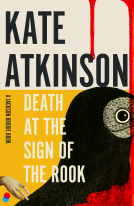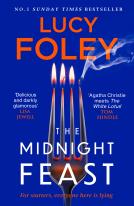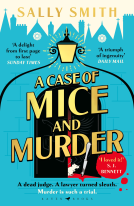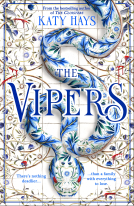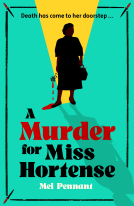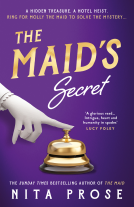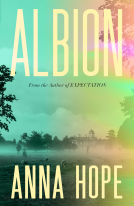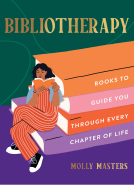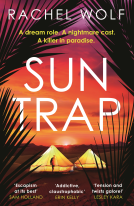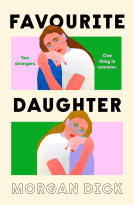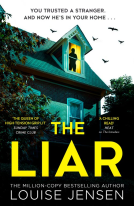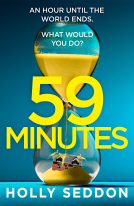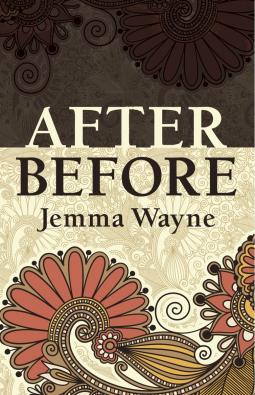
After Before
by Jemma Wayne
This title was previously available on NetGalley and is now archived.
Send NetGalley books directly to your Kindle or Kindle app
1
To read on a Kindle or Kindle app, please add kindle@netgalley.com as an approved email address to receive files in your Amazon account. Click here for step-by-step instructions.
2
Also find your Kindle email address within your Amazon account, and enter it here.
Pub Date 1 Jun 2014 | Archive Date 18 May 2015
Description
**Longlisted for the Baileys Prize**
After Before is an intimate and beautiful novel about three women whose lives interweave: Emily - a Rwandan Genocide survivor, Lynn - a terminally ill woman in her early 60s and Vera - a young woman struggling to come to terms with her troubled past.
Spanning cultures and ages, the novel explores the universality of guilt, regret, and grief. This year is the 20th Anniversary of the Rwandan Genocide, and the novel gives a moving insight into the personal atrocities experienced at the time. Jemma researched the book through first hand interviews with a Rwandan Genocide survivor and reading War Crime documents.
Blurb
“That was the day that Mama made the rules: If they come, run. Be quiet and run. But not together. Never together. If one is found, at least the other survives….”
During a cold, British winter, three women reach crisis point. Emily, an immigrant survivor of the Rwandan genocide is existing but not living. Vera, a newly Christian Londoner is striving to live a moral life, her happiness constantly undermined by secrets from her past. Lynn, battling with an untimely disease, is consumed by bitterness and resentment of what she hasn’t achieved and what has been snatched from her.
Each suffering their own demons, their lives have been torn open by betrayal: by other people, by themselves, by life itself. But as their paths interweave, they begin to unravel their beleaguered pasts, and inadvertently change each other’s futures.
Advance Praise
‘A powerful novel. It's characters will haunt you long after their stories have been told.’ Naomi Gryn
‘A fearless and meticulously observed examination of pain transformed by the redeeming power of friendship’ Vanora Bennett
‘Cosy domestic scenes in suburban London, brilliantly described, are used to contrast with experiences of absolute horror at the heart of a deep and shaming secret. For life to move on, all must be forgiven, no matter how difficult this may be.’ Phillip Knightley
‘Jemma Wayne has very skilfully managed to weave together not only the alternating strands of her compelling narrative but also passages of intense action with reflective inner monologue. A highly accomplished debut!’ Gerald Jacobs, The Jewish Chronicle
Marketing Plan
Born to an American musician father, and English mother, Jemma grew up in leafy Hertfordshire and studied Social and Political Sciences at Cambridge University and Broadcast Journalism at the University of Westminster. She began her career as a journalist at The Jewish Chronicle and now works freelance splitting her time between journalism, writing for stage, and prose. Her first play, Negative Space, was staged in 2009 at Hampstead’s New End Theatre, receiving critical acclaim.
Available Editions
| EDITION | Other Format |
| ISBN | 9781909878846 |
| PRICE | £7.99 (GBP) |
Featured Reviews
 Teri A, Reviewer
Teri A, Reviewer
This powerful novel has amazingly haunting characters that will definitely stay with you. It's an intense read, so I would say that it's best to select "After Before" when you have a long, lazy weekend planned - and not much else! It's an emotional book that you'll want to read again as soon as you finish it.
 Margitte M, Reviewer
Margitte M, Reviewer
For the widow Lynn, her two sons John and Luke, as well as Luke's fiancé, Vera, and Rwandan refugee Emily, happiness were abandoned a long time ago.
Secrets and hurt After Before, led them slowly and quietly into darkness. Mentally, emotionally, as well as physically, they were slowly dying because of the wounds from their respective pasts that were still mentally bleeding them dry.
Luke found solace in his dedication to Jesus. It did not matter how his insecurities or strong urge to control, reflected on other people. He was the responsible one; the decision maker, the one calling the shots.
John found his solution in theater and making people laugh.
Lynn had her valuable porcelain collections and her paintings behind a locked door. She gave up her dreams of becoming a historical fiction writer, to fit into her late husband Philip's world and raise her two boys. She secretly treasured her own ambitions and dreams, painting it all onto multiple-colored canvasses where nobody could see them behind the locked door of her studio.
Vera wanted her savior to be Luke. She wanted to start a new life after drugs, a tragedy, and a mentally abusive relationship with Charles. She wanted to be pure and good and keep her secret hidden from her family and fiancé. But the estrangement from her parents, her decision to become religious and her fear of losing Luke, brought her to a point where the silence became devastating.
Emily, the Rwandan Tutsi refugee, had to endure the truth behind her mother's words: you can outrun the things outside your body, but not the truth hidden inside it. Her lonely road deeper into hell was non-negotiable. She wanted to be left alone with her sorrow in her own silent world that deafened her.
" And all at once, there was an alternative" which none of them ever explored until terminal cancer was diagnosed in Lynn.
They were forced to open up the chest of darkness, exposing their inner turmoil to searing light. None of them was able to escape while time was running out. The resentment, hatred, insecurities and traumatic memories began their ascend towards light, towards real forgiveness and redemption.
This is a powerful, intense, introspective novel. One that leaves the reader in deep reverie and retrospection. Very well written. There were gentleness, and brutality; insecurity and grace.
I think of the concept 'emotionally charged' when I think back on the experience. A beautiful read. It is a book I would like to read again and can highly recommend it. However, the ending was too much of a cliffhanger in some ways, to really complete the emotional roller coaster ride. But still a very commendable read despite of it. The Rwandan genocide places this book in the historical fiction genre, since an important part of African history is highlighter in the book. I am, however, not sure if it was meant to be classified as such. But it was done brilliantly.
I want to thank Legend Press, through Netgalley, for the opportunity to review this book.
 Anita W, Reviewer
Anita W, Reviewer
Initially, I was unsure that I wanted to read a novel featuring genocide, but I'm delighted that I took the chance. Jemma Wayne has used the issue of genocide as a theme. It's very difficult to explain without giving away too much in terms of plot and characters, but this is more a story about three very different individuals. All female, strong, intelligent characters with a backstory. Emily, a Rwandan, has life experience that most readers will only ever see as a news story. We may have heard of Hutsi and Tutu, but it's difficult to grasp the reality of interracial tension. There are stark examples in this narrative and how the experiences in another land and culture shape the individual.
Emily is terminally ill and whilst, on the surface her life has been happy and fulfilled, scraping the surface reveals regret, lost opportunity and lack of fulfilment despite the veneer of perfection. Vera is particularly complex. She's now with Luke, Emily's son, and entangled with religion. But with profound conflicts and dark secrets, how will she manage her current situation? Luke is controlling and wants her to conform to his mould. The narrative carefully reveals the earlier experiences which have shaped the three and brings them together in a compelling and complex storyline which explores a number of universal themes.
There's a lot of guilt, some forgiveness and an undercurrent of religious fervour. Emily's experiences are stark and gut wrenching but take the book to a different level; extraordinary. It's haunting and left me thinking about the characters, events and the issues.
As an aside, which won't affect my 5 star rating, the cover seems bizarre. It reminds me of an early 1980's Laura Ashley pattern for curtain material. On cover alone, I'd have passed this by. It cheapens the content which has some of the most powerful writing I've read so far this year.
My thanks to the publisher for making a review copy available through Netgalley.
 Eric A, Reviewer
Eric A, Reviewer
The question of how to reconcile the past is at the centre of Jemma Wayne’s debut novel “After Before”. What’s fascinating about this book is the way the author approaches this dilemma through the lives of three very different kinds of women. Emily is a young, Rwandan-born woman living in England. She struggles to survive on low-paid work and lives in social housing. Having abandoned her real name Emilienne because English people have difficulty pronouncing it, she’s effectively invented herself anew and blocks out memories of her past as much as possible. Vera is another young woman who is a recently-converted Christian trying to live her life on the straight and narrow. During her early life she lived a more reckless existence that was freely-sexual and drug-fuelled. She desperately wants to be the kind of virtuous individual worthy of her extremely virtuous fiancé Luke, but she’s hampered by a horrific secret from her past. Luke’s mother Lynn is in her late 50s and recently been diagnosed as being in the advanced stages of a terminal cancer. She filters her disappointment about all the compromises she’s made in her life into her hidden passion for painting. The stories of these women’s lives twine around each other as they variously come together and change the way each woman understands her own past.
It’s interesting how Wayne effectively captures the way individuals maintain a constant narrative about their lives in the present. Vera likes to believe herself to be the protagonist of a larger story being viewed and commented upon: “If Vera’s life were a film, there would be a lot of voiceovers.” She’s making earnest efforts to become what she understands to be a better person, yet she can’t fully believe in her reformed self because of the hidden guilt she carries over the (moral and legal) crimes she believes she’s committed. Rather than seeking out the truth about the effect of her actions, she distances herself from her past and mentally self-flagellates herself which prevents her from becoming the person she really wants to be or have an authentic relationship with the man who has asked her to marry him.
Lynn has very conflicted feelings about her future daughter-in-law Vera. She’s particularly offended by the way her sons have decided she requires help in her house given her medical condition. Vera is elected to spend her days with her, yet all Lynn wants to do is foster her secret passion for painting which Vera’s presence prevents. There are incredibly socially-awkward scenes where the two women try to make conversation over civilized cups of tea. Painting is the way in which Lynn is trying to make up for lost time. She feels that she’s sacrificed any prospect of a career or making a cultural impact upon the world by spending her life raising two sons. No doubt many people can relate to the way Lynn feels proud of the family she’s nurtured, yet trapped by the domesticity of it. Looking back she hilariously decides that: “She should never have taken such joy in baking.” Although Lynn comes across initially as a venomous individual she’s gradually shown to be a woman with an enormous amount of compassion. Lynn reminded me very much of Elizabeth Strout’s character Olive Kitteridge. She’s someone who can be very hard and difficult on the outside. Yet, she harbours a tremendous kind of empathy and has an instinct for recognizing damaged individuals who need help. This is the case when Emily comes to care for her as part of a social home caring program after Lynn and Vera come into conflict with each other. Lynn senses that this girl has a difficult past which she is mentally blocking out.
Emily attempts to use her isolation and the anonymity of living in the city to forget the past. But simply coming to a new country and taking on a new identity doesn’t save someone from the physical and mental scars of experience. As the author astutely observes: “real rescue wasn’t possible simply by escaping a place. Memories weren’t rooted in the soil.” It’s heartbreaking the way that Emily tries to level out her life so she has no prospects for joy or sorrow in her life. She shuts herself out from possibility because “The good is only a reminder of the bad. The past is a reminder of what has been. She can only survive by not thinking. And therefore the not seeing has to be borne.” But when Emily can’t stop herself from encountering things which vividly recall incidents and people from her past she is jolted into an awareness of what she’s lived through. What she has survived through is terrifyingly awful and most readers will probably be aware of what is coming, yet it feels necessary to face this past as a way of progressing forward as a fully aware individual.
One of the great qualities of reading fiction is that it allows you to access complex events from history on a very human level. When reading figures on the news or historical accounts about the upwards of a million people killed in the 1994 Rwandan Genocide it’s difficult to feel the full gravity of this catastrophic event. The author brings this mass conflict to a personal level where we read about Emily living a normal adolescent life in her Rwandan town. Like many young people, her attention is mostly taken up by her family, school, friends and the early burgeoning of romantic feelings. She is aware of the growing conflict between Hutu and Tutsi, but this is just another story which is talked about: “stories, the kind that hovered tauntingly on the brim of their consciousness but they would never truly see: like monsters, or landing on the moon, or America.” Because it has no effect upon her day to day life, this tension between ethnic groups is as unreal to her as any myth or well-reported global events. Therefore, when we read Emily’s memories about armed Hutu civilians and militia coming to her door the shock feels all the more real because her life is so relatable and close to our own. Most strikingly, there is not only the horror of being in the centre of such a perilous situation, but the devastating betrayal of seeing one’s friends and neighbours trying to kill you and your family. It makes for very distressing reading yet it is admirable the way the author so effectively situates the reader in Emily’s position to understand how she came to be so traumatized and distrustful of allowing people into her life.
The way in which these three women’s lives play out through their encounters with each other is oftentimes surprising. By doing so Wayne gives an interesting perspective on the way identity is a constantly shifting process of sifting between one’s past, self-perception and the way others perceive you. Emily most keenly feels a crisis over this where she wonders “What was she? The only thing she wanted to be was human, and sometimes she wasn’t even sure about that.” It’s through different levels of interaction and compassion that the characters in this novel come to a more resolute understanding of themselves and feel fully human. The author is tremendously sympathetic towards her characters and skilled at creating an involving story so the reader cares about them as well. However, there are a few occasions where the scenes feel stretched and overlong. And occasionally Wayne’s prose style goes slightly sour from unnecessary flourishes such a scene describing the water in Venice: “She and Luke bounce malleably between the two worlds of density and translucence.” But overall the author has a keen sense of distilling observations about human nature into artful and poignant sentences. There were many times I felt emotionally affected by the story of “After Before” and it’s an accomplished brave first novel.
 Reviewer 200032
Reviewer 200032
I've always struggled to talk about books I really enjoyed in any great detail. When I dislike a book, I find it somewhat easy to identify the areas that don't work and spoilt the book for me. But when I like a book, it's hard. I want to draw love hearts around it and gush over it but I don't really know how.
Jemma Wayne's After Before is a book I love.
In After Before, Wayne gives us three women on the verge of revelation and revolution, who find themselves connecting and disconnecting as they confront their past and their uncertain future. There is Emily, or Emilienne, who survived of the Rwandan genocide and who survives still – but does not live. There is Vera, who is trying – and struggling – to lead a Christian, moral life, but whose dark past keeps pulling her back. And there is Lynn, diagnosed with a terminal illness and who looks back on a life of wasted potential and wasted hopes.
None of these women are perfect, at times unlikeable, but they are human and are understandable, even if they seem petty and, even monstrous at times. The only character I really disliked was Lynn's firstborn son and Vera's fiancé, Luke, who was utterly insufferable.
At this point, I admit I want to give copies of this book to people, urging them to read it to avoid trying to write this review. I also want to start using words like "intense" and "enthralling" and "painfully beautiful" – because After Before is all those things.
It's an intense, at times dark, read, taking people right into hopeless situations. It's enthralling – I personally found it hard to put it down, even when I only picked it up to read a chapter before bed. It is painful but utterly beautiful book. There is a lightness there in the story and in the writing, but there's also something incredibly unbearable.
This was an emotional read for me – as the third act of the story unfolded, I was holding back tears. I can only imagine that this emotional reaction would only increase in re-reads.
The one flaw I found was the ending – I would've preferred a little more certainty for Emily and I would've liked more of a resolution for Vera's story. However, the ending does work, in its own way.
Jemma Wayne's After Before is a book I love. Please forgive any incoherence in this review.
